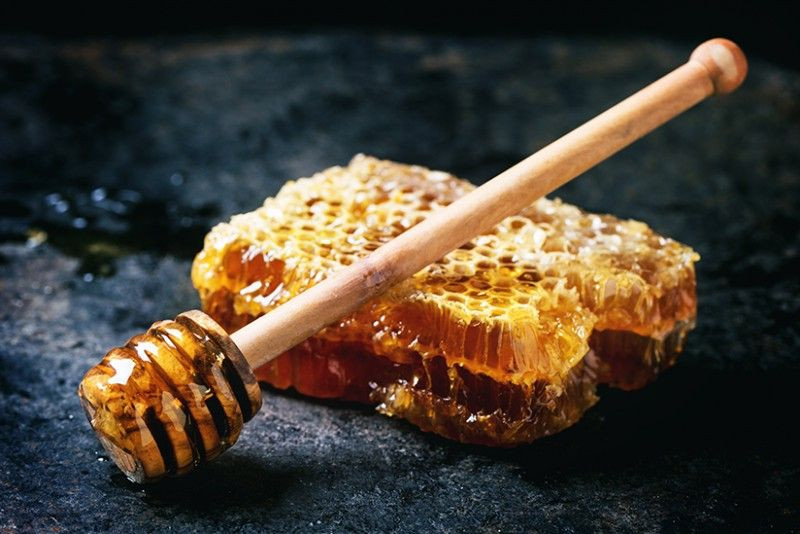Bees can be annoyances at backyard barbecues or Sunday afternoon picnics. Sometimes they can even be a real pain, as in Be careful where you stick that stinger. But there's a good side to the bee story as well. You might even call these brown or black and yellow bugs health nuts in a roundabout way. That's in the sense that a variety of their by-products are known to provide health benefits for humans. Remember that next time you suffer or, better yet, ward off a bee sting. There is plenty of buzz about honeybees when it comes to recognizing their helpful roles in not just everyday nutrition (think bee-produced honey) but also in medical science. These extremely hard-working insects pollinate plants (everything from avocados to zucchinis, per mindbodygreen.com) that feed us.
Meet the Honeybee
Their main roles are to protect their hive and support their queen (bee), per organika.com, while also preparing for times of scarcity. Their mission is not necessarily to serve or heal humans, but they do a nice job of that in several respects, albeit unwittingly. Honeybees not only are great providers, they also are terrific role models. They comprise a predominantly female society: 95 percent of hive occupants are female workers and daughters of the queen. Per mindbodygreen.com, they are selfless and work with swarm intelligence for the greater good of the hive. They do amazing things, like beat their wings at 250 times a second.Bee Products Are Grade A
Here are the various main bee products worth a closer look. Better yet, bring a spoon:- Bee Pollen. Bees use their pollen to feed their young, which makes sense considering that the substance is about 40 percent comprised of protein, and it is flush with vitamins, minerals, antioxidants, and fatty acids, per betternutrition.com. One of the truly neat things about bee pollen is that even if bees forget to deposit their pollen for hive use, that activity is taken care of automatically; every time bees re-enter the hive, the sticky substance is collected from their leg sacs by special openings that remove the pollen from the bee as it passes by. For humans, bee pollen, per naturalnews.com, has been used primarily for its anti-aging, overall health, and energy-boosting capacities. Some research scientists have even termed bee pollen a perfect food.
- Propolis. Also referred to as bee glue because it is produced and then used by worker bees to assemble, protect, and effect repairs on their hives, such as plugging holes and sealing cracks. As for the human aspect, per National Institutes of Health (NIH), propolis and its extracts can be used in treating a variety of diseases thanks to its antiseptic, anti-inflammatory, antibacterial and antifungal properties, among others.
- Raw Honey. Honey is described by NIH as a sweet liquid processed by the honeybee. It's considered most healthful in its raw form – before it gets pasteurized. Honey is known globally for components (to include glucose, fructose, flavonoid, polyphenols, and organic acids) that are high in nutrition; the kind of nutrition that benefits humans. It has been used for centuries by the likes of Egyptians, Greeks, Romans, and Chinese because it is known to heal wounds and diseases of the gut, including gastric ulcers, and it makes a handy remedy for cough, sore throat, and earaches. In India, a form of honey known as Lotus honey has been used to treat eye infections as well as other diseases. Closer to home, here in America, raw honey is considered an effective deterrent for the symptoms of seasonal allergies – also known as allergic rhinitis – such as sneezing, runny noses, and itchy, watery eyes, with the idea you want to be consuming this stuff – preferably a variety produced close to where you live – for several weeks in advance of allergy season to help build up immunity.
- Royal Jelly. Known as a superfood that within the hive colony is consumed solely by the queen bee, this white, viscous jelly-like substance is a form of hypopharyngeal and mandibular gland secretion from the worker bees, per NIH. In terms of human use, royal jelly is often used as a dietary nutritional complex to assist in fending off chronic health conditions. Its various pharmacological attributes include antibacterial, antiallergy, anti-inflammatory, and immunomodulatory effects. Royal jelly is an antioxidant source used as a nutritive tonic in herbal medicine, per organika.com, and it also has been shown to help maintain healthy levels of cholesterol. Its other reported health benefits include treating infertility and relieve menopausal symptoms, with one study, as cited by betternutrition.com, showing it to be more effective than prescription estrogen in diminishing the symptoms of menopause. Males reportedly benefit as well, in terms of enhanced sperm count and testosterone levels, thus improving male fertility.

